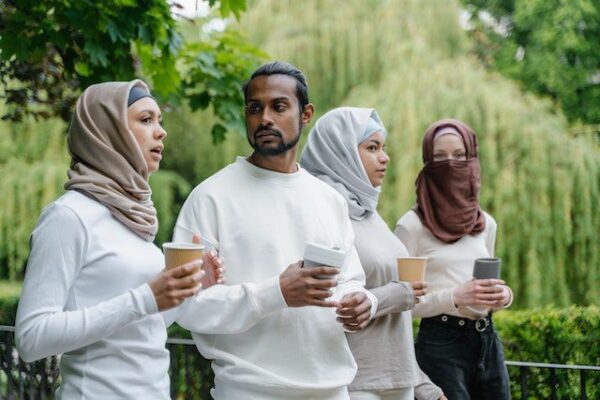Coffee is not merely a beverage; it is a cultural phenomenon that has woven its way into the fabric of societies around the world. Beyond the simple act of enjoying a cup of coffee different cultures have developed their own unique traditions and rituals surrounding this beloved drink. In this article we will take a journey across continents and explore the diverse coffee rituals that exist in various cultures each with its own fascinating customs and practices.
Table of contents
Ethiopia: The Birthplace of Coffee Ceremonies
Our exploration begins in Ethiopia the birthplace of coffee itself. Here coffee ceremonies hold a special place in the hearts of Ethiopians. The ceremony is often led by a woman referred to as the “Buna Buhran” who skillfully roasts the coffee beans over an open flame. The room fills with the rich aroma of freshly roasted coffee as participants engage in lively conversations and enjoy the process of preparing and serving the coffee. This ritualistic experience symbolizes hospitality community and the celebration of coffee’s cultural heritage.
Turkey: The Art of Turkish Coffee
In Turkey coffee holds a deep-rooted significance and the preparation of Turkish coffee is considered an art form. Finely ground coffee beans are simmered in a special pot called a “cezve” and served in small delicate cups. The key is to savor the coffee slowly while engaging in meaningful conversations. Turkish coffee also has a unique tradition of fortune-telling. After finishing the coffee the cup is inverted onto a saucer and the patterns left behind in the cup are interpreted to reveal glimpses of the future.
Italy: Embracing the Espresso Culture
Italy is synonymous with espresso and the Italian coffee culture is a cornerstone of the country’s daily life. Italians take their coffee seriously often standing at the bar of a café to quickly savor a shot of rich concentrated espresso. The emphasis is on simplicity and quality with baristas meticulously crafting each cup. The social aspect is also essential as coffee breaks become moments of connection and camaraderie among friends and colleagues.
Morocco: The Art of Mint Tea and Coffee
While mint tea takes center stage in Moroccan culture coffee also plays a significant role in social gatherings. Moroccan coffee is typically served strong and sweet often flavored with spices such as cardamom or cinnamon. The preparation and serving of coffee are accompanied by elaborate rituals with the host pouring the coffee from a traditional pot into small cups from a height to create a frothy layer on top. The warm aromatic coffee fosters a sense of hospitality and warmth in Moroccan homes.
Japan: The Serenity of the Japanese Tea Ceremony
Although tea is the dominant beverage in Japan the country has also embraced the art of coffee particularly in specialty coffee shops. Japanese coffee culture emphasizes precision quality and attention to detail. Baristas masterfully brew pour-over coffee using intricate methods like the “siphon” or “V60” pour-over techniques. The experience is serene with the focus on appreciating the subtle flavors and aromas of the coffee in a calm and contemplative environment.
Sweden: Fika the Swedish Coffee Break
In Sweden coffee breaks are elevated to an art form known as “fika.” Fika is a cherished tradition where friends family or colleagues gather over coffee and pastries to unwind and enjoy each other’s company. The emphasis is on relaxation with the pace of life slowing down during these moments. Swedes take fika seriously and it serves as a vital part of their daily routine allowing for meaningful connections and a chance to recharge.
Brazil: The Joy of Cafezinho
In Brazil coffee is deeply ingrained in the national identity and the culture revolves around “cafezinho” – small strong cups of black coffee. Brazilians are known for their warm hospitality and offering cafezinho to guests is a sign of welcome and friendship. The coffee is often sweetened and it is customary to enjoy multiple cups throughout the day. Coffee breaks in Brazil are lively and convivial with animated conversations and laughter filling the air.
FAQS
1. How do different cultures around the world prepare and enjoy their coffee?
- Coffee preparation and consumption vary widely across cultures. While some prefer strong black coffee others may enjoy it with spices milk or in elaborate rituals.
2. What are some unique coffee rituals in Middle Eastern cultures?
- In Middle Eastern cultures coffee is often prepared in a traditional method called “Arabic coffee” or “Turkish coffee” and it is served during social gatherings as a symbol of hospitality.
3. How is coffee consumed in East African cultures considering coffee’s origin in Ethiopia?
- In East Africa coffee is often part of social rituals. In Ethiopia the coffee ceremony is a significant tradition where coffee is roasted ground and brewed in a communal setting.
4. Are there specific rituals associated with coffee in South American countries?
- South American countries particularly in regions like Colombia and Brazil have unique coffee rituals. Coffee is often enjoyed in social settings and there are variations in preparation methods.
5. What role does coffee play in Scandinavian cultures known for their coffee consumption?
- Scandinavians have a strong coffee culture with a tradition called “fika” in Sweden which involves taking a break to enjoy coffee and pastries. Coffee is an integral part of daily life.
6. Are there any spiritual or ceremonial uses of coffee in certain cultures?
- In some cultures coffee is incorporated into spiritual or ceremonial practices. For example in Ethiopian Orthodox Christian ceremonies coffee may be part of religious rituals.
7. How do Asian cultures approach coffee rituals especially in countries like Japan or Vietnam?
- Asian cultures have unique approaches to coffee. In Japan there’s a focus on precision in coffee brewing while Vietnamese coffee often involves the use of condensed milk.
8. Are there any specific coffee rituals in European countries?
- European countries have diverse coffee traditions. In Italy the espresso culture is prominent while in France coffee is often enjoyed with pastries in a leisurely manner.
9. How have modern coffee rituals evolved with the rise of specialty coffee culture?
- With the emergence of specialty coffee modern rituals focus on appreciating the nuances of coffee including brewing methods like pour-over AeroPress and espresso variations.
10. Can you recommend any books or resources for further exploration of global coffee rituals? – “The World Atlas of Coffee” by James Hoffmann and “Uncommon Grounds” by Mark Pendergrast provide insights into the global diversity of coffee rituals.
Global Harmony in Coffee
As we travel the world exploring the diverse coffee rituals and traditions we discover a common thread that unites us all. Coffee serves as a catalyst for human connection bringing people together across cultures languages and borders. Whether it’s the Ethiopian coffee ceremony the Turkish art of coffee brewing or the Italian espresso culture these rituals remind us of our shared appreciation for the warmth and comfort that coffee brings to our lives.

Hi, I’m Jodie! I’m a spain-Moroccan writer with a passion for imagination, adventures, magic and stories with heart.
Please don’t hesitate to contact me for any questions, suggestions, comments or feedback.

















Add comment